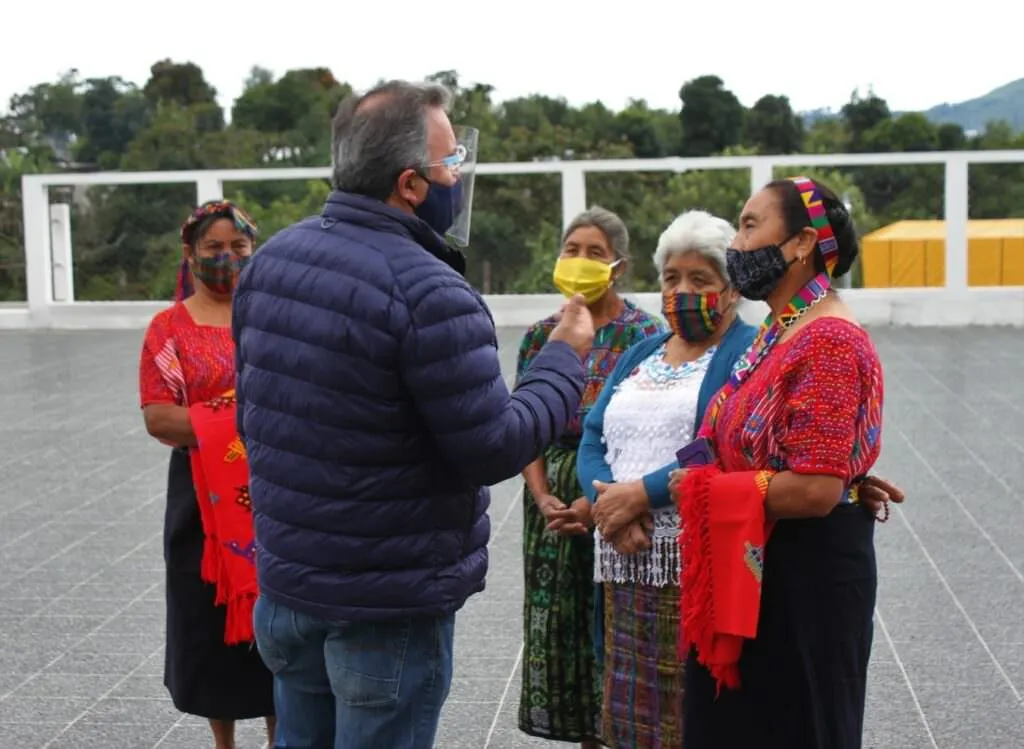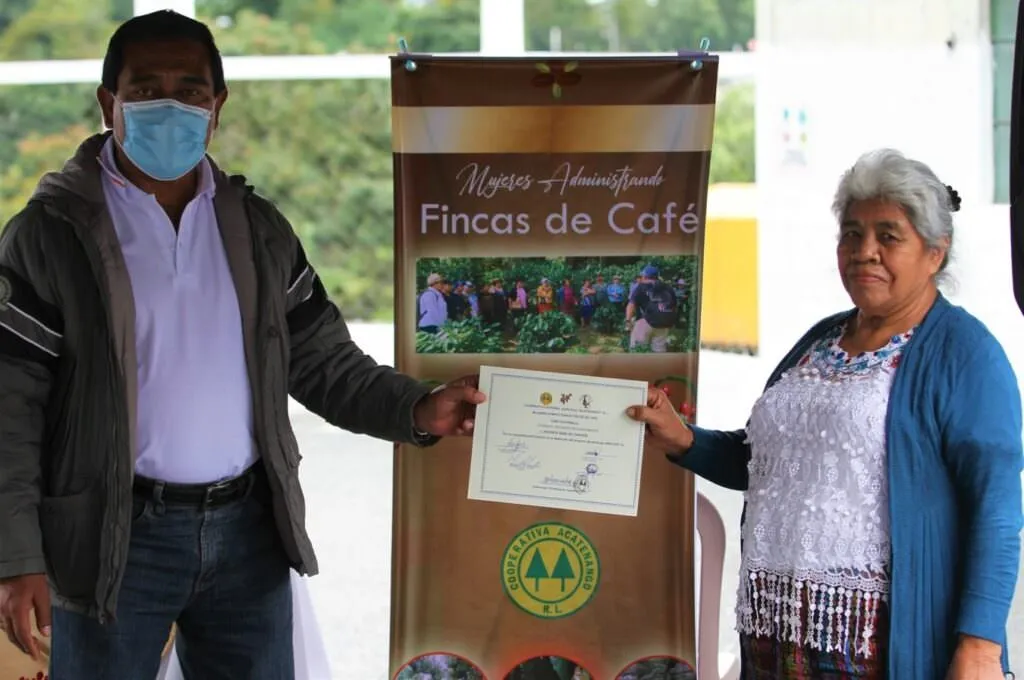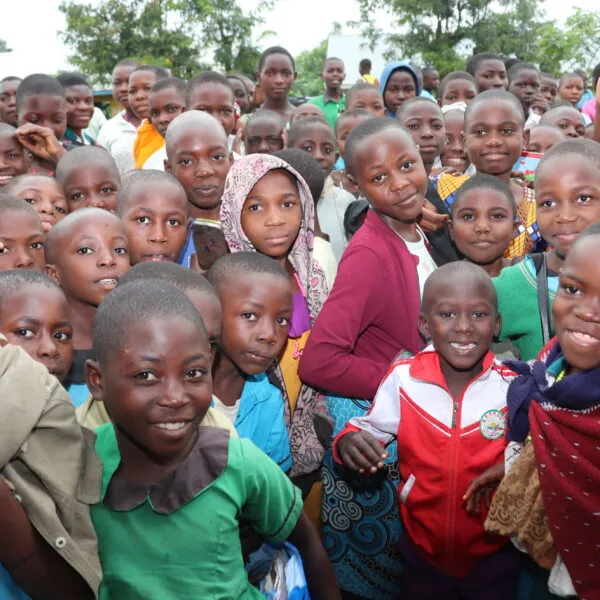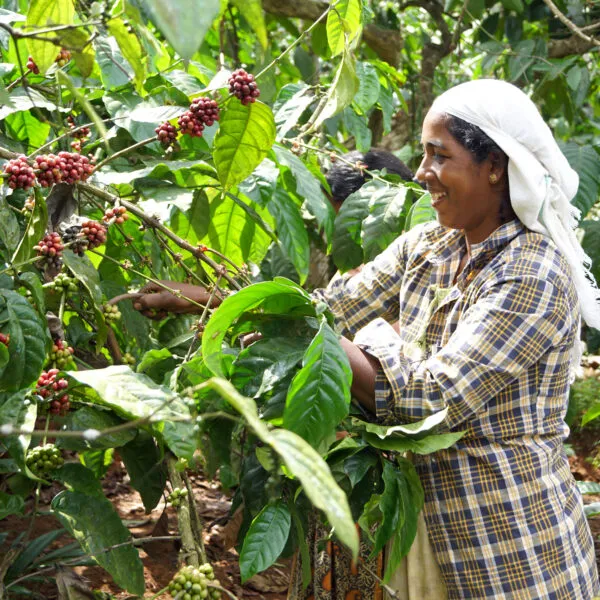To achieve gender equality, economic growth, and future sustainability, women must be included in agriculture. On the global scale, the United Nations has recognized gender equality and empowerment of women and girls as a top priority in their Sustainable Development Goals. The coffee sector is no exception to this issue.
To increase women’s leadership in coffee, the UTZ program (now part of the Rainforest Alliance), Lidl, and CARE partnered together on a two-year initiative called “Project Guatemala.” Taking place from 2018 to 2020, this project focused on gender inclusiveness and women’s empowerment within Cooperativo Agrícola Integral Acatenango. The Guatemalan coffee cooperative is made up of 357 small farms, 92 of which are managed by women. Overall, the project aimed to improve both productivity and climate resilience for the women-managed farms.
“This project was a unique experience; it created individual and collective leadership. It trained us to accomplish greater empowerment as women, which is new to us, and positioned us to make decisions and address education. These are important topics for us, and for the new generations of our families.”
Doña Vicenta, Doña Rosalba, Doña Manuela (women’s project leadership)
Watch the recap video below:
Key Results
Through multi-stakeholder collaboration, Project Guatemala carried out a clear approach to strengthen the capacities of women in the cooperative. The women involved in this project reported positive results, including more decision-making, confidence in public spheres, greater control over resources on their farms and homes, and stronger inclinations to participate in work groups. 95 percent of the cooperative’s women-led coffee farms now have control systems in place to guarantee better agricultural practices and adaptation to climate change. The initiative has set an example for others to follow.

Objective 1: Evaluation of risks and needs
In our initial evaluation, we discovered that the women in the cooperative—making up 26 percent of the total farmers—produced a whopping 40 percent (310 metric tons) of the harvest. The first year of the project also increased awareness within Cooperativo Agrícola Integral Acatenango, its members, and its managers of the need to consider gender equity in their operations.
During the evaluation, the women made it clear that they were interested in trainings on sustainable farming, agrochemical usage, finances, and entrepreneurship. We carried out trainings through a variety of methods, including educational visits, an exchange of experiences with other coffee-growing cooperatives, workshops, and practical exercises on the land. The range of opportunities allowed for learning by doing, making the trainings more accessible for women with different educational levels.
Objective 2: Improve coffee productivity and income for smallholder women farmers
The initiative encouraged the group to adopt climate-smart farming techniques in order to continue producing high-quality coffee. After undergoing trainings and adopting new technologies, the participants sought out opportunities for innovation. They worked together to implement a warehouse facility and a seedling nursery, using plastic tubes to transplant young seedlings. These tubes were reusable, reducing waste and the use of plastic bags. The women also strengthened their farms’ climate resilience and water access by constructed 19 rainwater harvesting systems. Additionally, they learned more about coffee growing and marketing through further trainings.

“At my age, I must retire,” said Doña Vicenta of the women’s project leadership. “But my granddaughter is involved and that leads me to believe that I am doing the right thing.”
This project increased the women’s contributions to their family’s income, added value to their family lives, and encouraged the transfer of knowledge between generations. The women also taught us an important lesson: that teamwork is instrumental for success. As a result, the group is motivated to engage with more women and continue growing their community. These results show a solid foundation for sustainability.
Objective 3: Social and economic empowerment of women coffee farmers
Achieving true behavioral change in two years is no easy task. Yet, the participants’ progress in fighting indifference and ‘machismo’ allowed them to gain respect in a male-dominated environment. At the beginning of this project, women seeking leadership roles broke social norms and industrious women were often met with resistance from men. Now, at the project’s end, a woman holds the secretary position on the cooperative’s board of directors. This was a big step, especially since women were historically left out of decision-making spaces.
Following this project, 60 percent of women leaders have strengthened their professional capacities. Their enhanced skills and partnerships allow them to have a say in the cooperative’s policies. In addition, all the interviewed participants reported that the group experienced a significant change in perspective—feeling more confident, motivated, and having higher self-esteem than before.
Next steps for long-term progress
“We believe that out of 111 women who participated in this project, many will continue to learn skills to face a future of good quality coffee.”
Doña Vicenta, Doña Rosalba, Doña Manuela
Although Project Guatemala was successful, there are still challenges ahead. Future projects—and continued efforts by industry partners—will help further the advancement of women farmers. That’s why the Rainforest Alliance and CARE Nederland have signed an agreement to jointly promote gender equality and women’s rights in all relevant agricultural supply chains in the countries where we both work. In this partnership, the Rainforest Alliance focuses on supporting farmers and cooperatives and improving their management and practices. CARE Nederland focuses on communities, providing tools and approaches to support them socially and economically, with a special attention to the position of women and girls. The organizations will support companies by developing project proposals to improve the social and economic position of women and girls in their supply chains.
Reach out to us or your account manager directly if your company wants to deepen its commitment to a more sustainable coffee sector.




